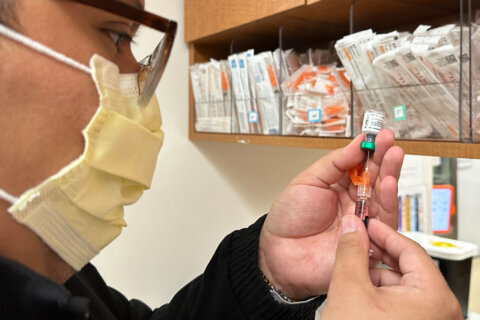Sleep is essential for biological recovery of your body and brain so they can properly function during the day. When your body does not get enough good quality sleep, your risk of health problems may increase.
Poor or disrupted sleep patterns, for instance, can disrupt your natural circadian rhythms (or sleep-wake cycle), which then negatively affects several hormones and increases risk for Type 2 diabetes, heart disease, high blood pressure and obesity, among other health issues.
“It can affect your memory, your cognition and your ability to fight infection,” adds Dr. Rachel Salas, a professor of neurology and assistant medical director at Johns Hopkins Center for Sleep and Wellness in Maryland. “It can make you look older and can affect your mood and reaction time.”
If you are experiencing difficulty sleeping, you’re not alone. According to the National Institutes of Health, 50 to 70 million Americans have sleep disorders and 1 in 3 adults are getting an insufficient amount of sleep.
Sleep affects every aspect of your life, and that’s why it’s crucial to get enough rest every night.
[READ: Signs You Aren’t Getting Enough Sleep.]
How Much Sleep Is Enough?
According to the National Institutes of Health, somewhere between seven and nine hours a night is a good rule of thumb for most adults. When healthy adults are given an unlimited opportunity to sleep, they will sleep between eight and eight and a half hours a night. Sleep scientists advise that the optimal amount of sleep varies from person to person, but consistently sleeping less than seven hours can lead to health risks.
[READ: Acupuncture for Insomnia: How Acupuncture Can Help You Sleep.]
14 Tips for Better Sleep
To help you get the essential rest that your body needs, here are 14 proven methods to get better sleep.
— Maintain a regular wake and sleep pattern
— Create a relaxing bedtime routine
— Put down the electronics
— Create a sleep-friendly bedroom environment
— Exercise consistently
— Try blue light-filtering lenses before going to bed
— Pick up a book before bed
— Match your mattress with your sleep position
— Limit alcohol, caffeine and nicotine
— Get the temperature right
— Get enough exposure to sunlight
— Avoid large meals within four hours of bedtime
— Avoid too much water before bed
— Consider natural sleep aids
Maintain a regular wake and sleep pattern
One of the best things you can do is maintain a regular bedtime. Since most adults need those eight hours of sleep, give yourself enough time before you need to be up the next day to hit that target.
Maintaining a consistent schedule is also critical because the body’s internal clock relies on consistency. Establishing a regular sleep and wake pattern can help you fall asleep faster — and remain asleep — until it’s time to wake up and start your day.
Inconsistency, on the other hand, can confuse your brain and body, negatively affecting sleep quality and daily life.
Create a relaxing bedtime routine
To develop a non-stimulating evening ritual, you might recall what your parents did when you were young to get you in sleep mode: taking a warm bath or sipping a cup of chamomile tea. Either option will raise your core body temperature, which leads to a drowsy feeling as you cool down.
It also takes some time for the body to shift into sleep mode. To nudge things in the right direction, spend the last hour before bed doing a calming activity, such as listening to soothing music or soaking in a warm bath. Avoid exercise and meals too close to bedtime as they can make it harder to fall asleep.
Put down the electronics
Avoid using electronic devices like laptops, smartphones or tablets before bed. Even small electronic devices can emit sufficient high-energy blue light to disrupt sleep and miscue the brain, lowering melatonin levels and promoting wakefulness instead of much-needed shut-eye.
Another reason to put the electronics down before bed is to avoid social media, which can cause increased energy and anxiety. The rapid stimulus from scrolling through social media feeds can make it harder to fall asleep and worsen sleep quality.
“If you can, eliminate any electronic use an hour before bedtime,” Salas advises.
You should also put your phone away while getting ready for bed to avoid distractions and delaying bedtime.
[READ: Foods for Better Sleep.]
Create a sleep-friendly bedroom environment
Ensure your bedroom is a dark, cool, quiet place. Ideally, computers and TVs — as well as restless pets — should stay out of the sleep environment. Make sure you’re going to bed in a clean bedroom without any clutter. A messy room may negatively impact sleep quality as it reminds you of other things that need to be done.
Exercise consistently
Routine physical activity can lead to better sleep quality. A 2023 systematic review found that there is a positive impact between moderately intense workouts and improved sleep quality. Staying physically active can make you more tired at the end of the day, help you fall asleep faster and help you sleep through the night.
Physical activities can best help to improve your sleep if done earlier in the day. The same 2023 review concludes that “nighttime physical exercise, especially high-intensity interval training, could affect sleep quality if performed less than an hour before bedtime.”
Try blue light-filtering lenses before going to bed
Blue wavelengths, which are at the high end of the light spectrum, are beneficial during daylight hours because they boost attention and mood. The problem is getting all that high-energy blue light at night.
Blue light-blocking glasses worn in the evening can help reduce eye strain associated with excessive screen and LED lighting and helps restore your natural circadian rhythms. Preliminary research suggests that wearing blue-light blocking glasses for three hours before bedtime may help improve sleep quality, especially among those who suffer from insomnia.
Several brands of blue light-blocking glasses are available from companies like Pixel, Felix Gray, Gunnar and Spektrum.
Pick up a book before bed
Reading a book that’s not too stimulating before bed may help you fall asleep. A 2021 study found that those who read a book before bed had improved sleep quality in comparison to those who did not read before sleeping. Those in the study who read before bed also experienced fewer issues sleeping throughout the night.
When reading before bed, be sure to use a real book instead of an electronic device, as the blue light, as mentioned, may disrupt sleep.
Match your mattress with your sleep position
Mattresses have come a long way, so there’s no excuse not to have a good mattress that’s designed for your sleep position. If your mattress is too soft, too firm or just not right, consider a new one. Saatva, Avocado, Leesa, Purple and other brand mattress companies offer online tools to help you find your perfect match based on your weight, sleep position and personal preferences.
Limit alcohol, caffeine and nicotine
Although it may be tempting to unwind with a glass of wine, cocktail or “nightcap” after a stressful day, alcohol inhibits deep, restorative REM sleep. More specifically, while alcohol’s sedative effects may help you fall asleep faster, people who drink alcohol will often wake up in the middle of the night when the effect of the ethanol wears off, and it can impact nighttime breathing. That’s why many drinkers report feeling tired and groggy the next day.
And while caffeine may help you stay awake longer, when your body is telling you it is craving sleep, caffeine will only make it harder for you to get some shut-eye. Caffeine blocks the receptors for the hormone adenosine that tells your body it’s time to sleep. A good rule of thumb is to include caffeine in your day only in the morning and then skip it in the afternoon and evening.
Like caffeine, nicotine is also a stimulant that keeps you awake, and its use results in poor quality sleep. A 2021 study, for example, notes that nighttime cigarette use was associated with insomnia and shorter sleep duration.
Get the temperature right
For most adults, a cooler temperature, between 60 and 67 degrees Fahrenheit, is the optimal temperature for sleep, according to the National Sleep Foundation. A cooler room can promote better sleep because it works in tandem with the body’s natural circadian rhythms, which cause the core body temperature to drop lower during sleep. If you’re a hot sleeper, use high-quality, breathable bedding made of cotton, bamboo or other moisture-wicking fabrics to keep you more comfortable.
Get enough exposure to sunlight
It isn’t just the moments leading up to bedtime that matter. Getting enough exposure to sunlight during the day is a great way to promote better sleep.
“When you wake up at the same time every day, including the weekends, having breakfast by the window or outside if it’s not too cold or hot resets your brain to let it know we are starting the day,” Salas says.
Sunlight triggers your brain’s sleep-wake “clock” and is a frequently overlooked factor to increase sleep quality.
Avoid large meals within four hours of bedtime
Certain foods take longer to digest, so you don’t want to eat them within three to four hours of hitting the sack. Foods that are rich in fat and protein, for instance, leave the stomach more slowly. If you eat a heavy meal late at night, then you may feel too full when trying to go to bed.
The size of your last meal should also be smaller to help facilitate sleep. Eating too much food and lying down shortly thereafter can lead to gastroesophageal reflux disease (GERD), which makes it harder to get comfortable enough to even fall asleep.
Avoid too much water before bed
Staying well-hydrated is important during the day, but it’s not ideal at night. If you drink a lot of fluids in the evening leading up to your bedtime, you’ll wake up at least once during the night to go to the bathroom.
Generally, if you feel like you need something to drink before bed, take a few small sips of water, but don’t drink too much.
Consider natural sleep aids
Explore natural sleep aids like herbal teas (chamomile, valerian), lavender essential oil, magnesium, tart cherry juice or melatonin supplements. However, you should consult a health care professional before using supplements to make sure they’re right for you.
[READ: The Best High-Magnesium Foods and Supplements for Sleep.]
Sleep Deprivation
Sleep deprivation is when you do not get enough quality sleep. Sleep deprivation can make you inattentive, irritable, cranky and reaching for junk food doctors tell you to avoid.
Chronic sleep deprivation is when not getting enough sleep is a consistent issue. Chronic sleep deprivation can lead to numerous medical and psychiatric conditions, including diabetes, obesity, depression, high blood pressure, cardiac arrhythmias and substance use disorders.
Sleep deprivation is a real problem that many adults struggle with. More than one-third of adults in America consistently sleep less than seven hours per night, according to a 2016 study. Sleep deprivation can cause harm to you, and it can be hazardous to those around you; getting behind the wheel or taking care of children, for instance, can be risky if you haven’t had enough rest to function properly.
Signs You May Need Medical Attention
Lack of sleep can be serious. If you are experiencing any of these symptoms, you may have an undiagnosed, untreated sleep disorder or another health condition disturbing your sleep:
— Waking up tired after a full night of sleep
— Falling asleep during the day after a full night of sleep
— Dragging or feeling tired throughout the entire day
If you’ve tried the tips listed above and you are still not getting good sleep, seek medical attention from a general practitioner or, if you have access to one, a sleep specialist. There are also sleep centers accredited by the American Academy of Sleep Medicine.
What to Do When You Can’t Sleep
Cognitive behavioral therapy (CBT-I)
If your thoughts or behaviors at night are keeping you awake, it may be helpful to practice better sleep habits, sometimes with the help of a therapist.
CBT-I is a structured program with a sleep therapist who can help you identify patterns of overthinking and negative behaviors that make it hard to fall asleep.
“Get out of bed for 10 to 15 minutes if you can’t sleep,” advises Dr. Alcibiades J. Rodriguez, medical director of New York University Langone Health Comprehensive Epilepsy Center — Sleep Center in New York City. “Go to a chair and read something boring.”
When you start to feel drowsy, you can go back to bed.
Meditation
Some studies suggest mindfulness meditation can help reduce worrying and anxiety. The easiest way to practice mindfulness is to pay attention to your thoughts without labeling them as “good” or “bad,” while also remaining as much as you can within the present moment. This approach also means letting go of thoughts about what happened or what could happen.
4-7-8 Breathing
If practicing mindfulness meditation doesn’t work for you, you can try deep breathing techniques, such as 4-7-8 breathing, which have been shown to reduce stress. To begin 4-7-8 breathing, take a deep breath for four seconds. Hold your breath for seven seconds, then slowly release your breath and exhale while counting from one to eight. Repeat these steps several times, and then pause and notice if you feel more relaxed.
Journaling
If you tend to plan a lot in bed, it may help to journal your thoughts or make a to-do list in a different room before going to your bedroom to sleep, says Dr. Alon Y. Avidan, a professor of neurology at the University of California Los Angeles and director of the UCLA Sleep Disorders Center. If you don’t get out of bed to record your thoughts, “the bed then becomes a place for planning and thinking. It’s a place for hypervigilance,” he explains.
Bottom Line
Even though you can try a number of strategies to get to sleep at night, it’s still important that you review your daily routine and assess whether you need to make improvements.
“Whatever you do during the day, it’s going to affect your sleep,” Rodriguez says. “Living a healthy life will give you the best sleep.”
More from U.S. News
Best Sleep Aids and Sleeping Pills
Acupuncture for Insomnia: How Acupuncture Can Help You Sleep
14 Proven Methods for Better Sleep originally appeared on usnews.com
Update 08/12/24: This story was previously published at an earlier date and has been updated with new information.







